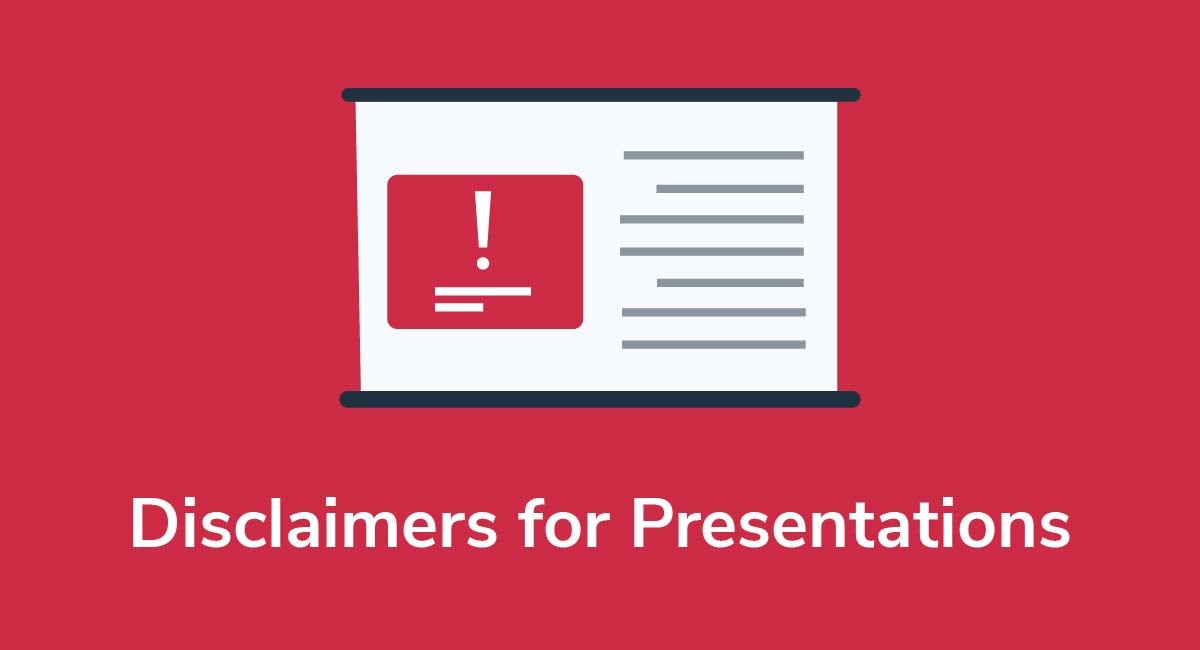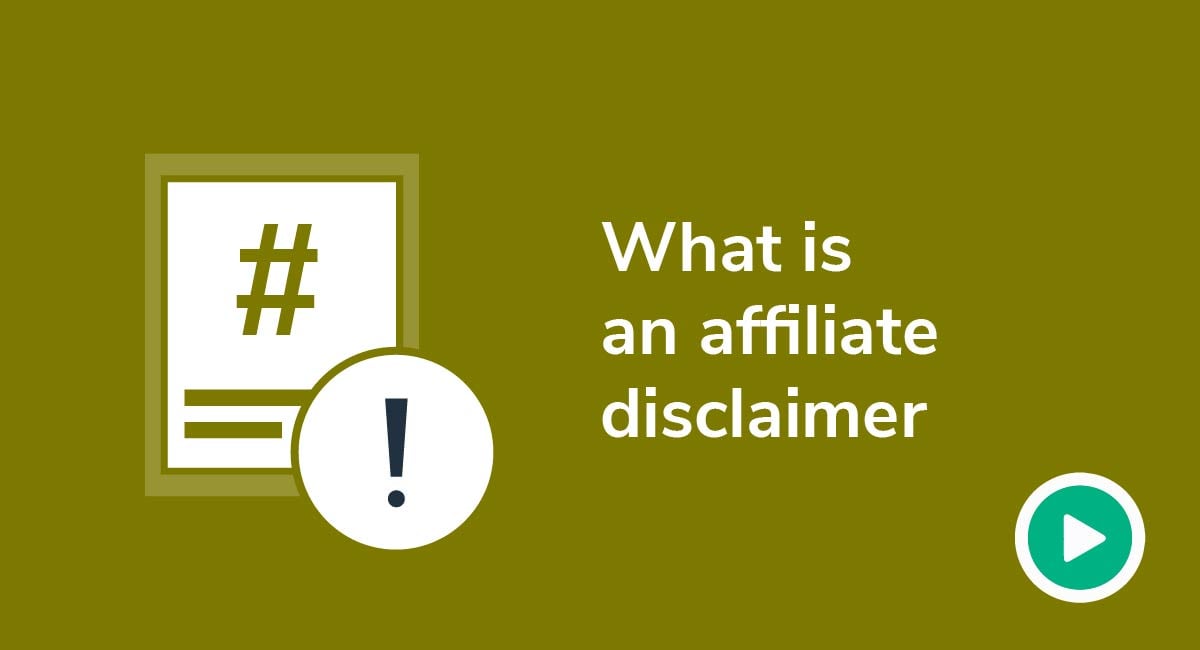Disclaimers for Surveys
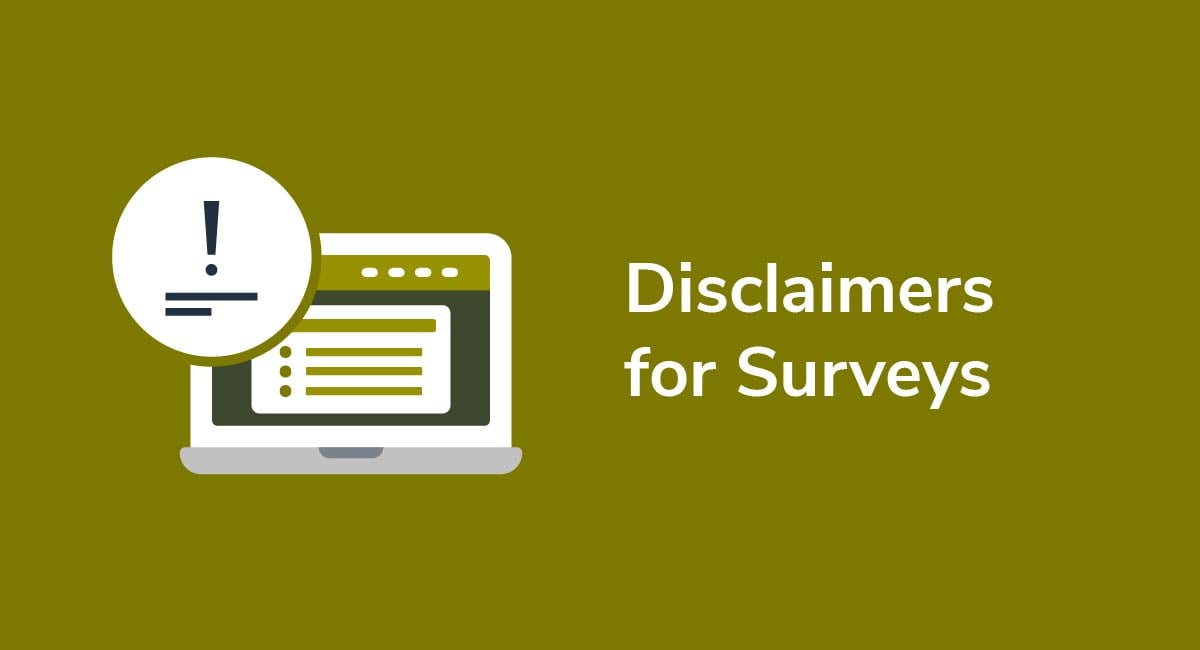
Surveys can provide organizations with valuable feedback that can be used to improve products and services. But collecting and processing personal data is inherently risky.
Thankfully, disclaimers for surveys can promote transparency, give participants peace of mind, and provide abundant protections for you and your organization.
In this article, we'll cover why disclaimers are so important for surveys, how to create them, and how to display them with your surveys.
Get compliant today with PrivacyPolicies.com
Select one of our generators to create the required legal agreements for your business:
- Our Privacy Policy Generator can help you generate a customized Privacy Policy in around three minutes, for free.
- Our Terms & Conditions Generator can help you generate a customized Terms & Conditions agreement in around three minutes, for free.
- Our EULA Generator can create a customized End-User License Agreement for your mobile or desktop app.
- Our Cookies Policy Generator can create a customized Cookies Policy to help your compliance with ePrivacy Directive and GDPR.
- Our Disclaimer Generator can create a disclaimer or disclosure for your website.
- Our Return & Refund Policy Generator can help your ecommerce store by creating a returns or refunds policy.
Integrate a free Cookies Notice and Cookie Consent banner to comply with the EU ePrivacy Directive and the new GDPR law regarding cookies.
- 1. What are Survey Disclaimers?
- 2. Are Disclaimers Required for Surveys?
- 3. Types of Survey Disclaimers
- 3.1. No Professional Relationship
- 3.2. Affiliate Links
- 3.3. Third Party Links
- 3.4. Copyright
- 3.5. Errors and Omissions
- 3.6. Consent
- 3.7. Compensation
- 3.8. Risks Associated with the Survey
- 4. How and Where to Display Disclaimers for Surveys
- 5. Summary
What are Survey Disclaimers?
Disclaimers for surveys are statements that let participants know important information like why you're conducting a survey, what types of data you'll collect, how it'll be used and protected, as well as for minimizing risk by rejecting future legal claims for damages resulting from errors, omissions, and specific acts.
They inform users of important information that can benefit them to know.
Are Disclaimers Required for Surveys?
While disclaimers for surveys aren't usually required by law, they sometimes can be a requirement. For example, in the U.S., the FTC requires that affiliate links come with an affiliate disclaimer.
Additionally, having such disclaimers can help limit your legal liability and keep your customers informed about important things. This is why you should have them even though it may not be a full legal requirement.
In effect, you may not need them, but you will definitely want them.
Types of Survey Disclaimers

There are a number of different types of survey disclaimers to consider. Some may be very appropriate for your survey, while others won't be relevant or needed. Consider the nature of your business and your survey to determine which disclaimers work best for you.
No Professional Relationship
No Professional Relationship disclaimers are particularly important when users might assume that participating in a survey or receiving feedback constitute a legitimate professional relationship.
This is especially true for legal and health-related surveys.
Baptist Health provides free online Health Risk Assessments designed to evaluate participant's health outlooks in the short and long terms.
The company includes the following clause in its Health Risk Assessment Disclaimer to establish that No Professional Relationship exists with users:
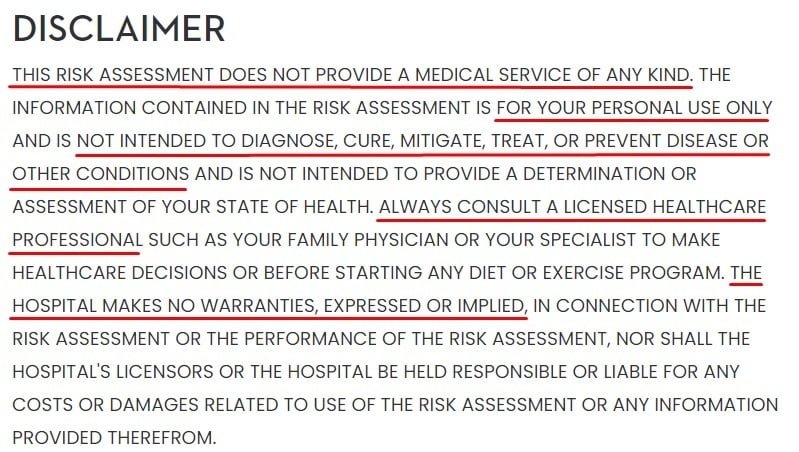
In the first sentence, Baptist Health's Disclaimer establishes that Risk Assessments are not a medical service.
It also lets users know that:
- The risk assessment survey is for personal use only and isn't intended to diagnose, mitigate or treat any condition or disease
- Users should always contact a licensed healthcare provider
- The hospital makes no expressed or implied warranties regarding the risk assessment
Affiliate Links
Affiliate disclaimers let users know that you may be compensated when they purchase a product or service from a third party that you linked to on your blog, website, or mobile app.
And to recap, the FTC requires that affiliate links come with affiliate disclaimers in the United States.
Here's Surveys Best Paid's Affiliate Disclaimer:
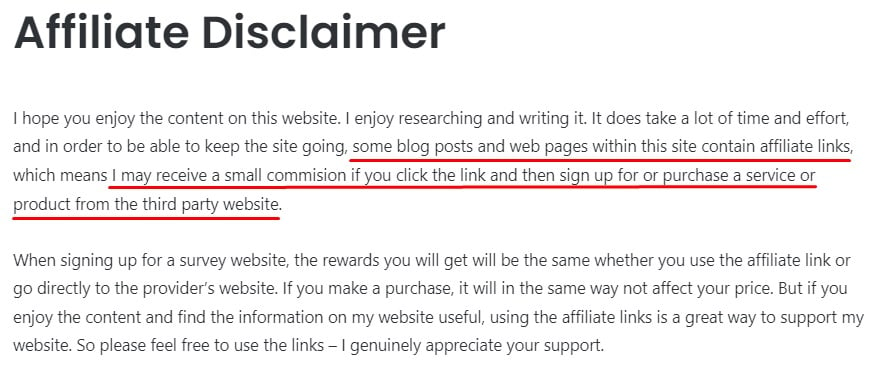
Third Party Links
If your survey links to other sites, you can benefit from a disclaimer that states you take no responsibility for the content on those other sites. This can keep you safe from liability for anything that goes awry on the other site.
Adaptive Surveys lets users know that it's not responsible for content found on websites it links to.

Copyright
In the United States, copyright law covers everything from paintings and photos to software and written content.
As such, it's wise to let users know in your survey disclaimer that the content on your website and surveys is your property and can't be used without your permission.
Here's how survey company Polco addresses copyright enforcement:
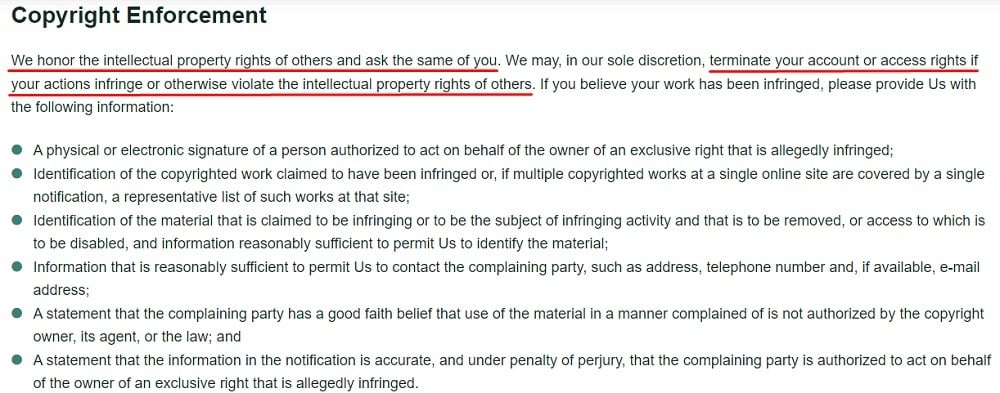
Polco makes it clear that respecting copyright is a two way street, and that it can terminate user's accounts if they violate the property rights of other users or the company.
Polco also provides a bullet pointed list of steps users must take if they think the company has violated their property rights.
You can and should also include a standard copyright disclaimer with your survey to protect its content.
Errors and Omissions
Surveys, websites, and mobile apps are rarely complete and error free.
By addressing this in your survey disclaimer, you can let users know that you aren't liable for damages if issues arise from inaccurate, incomplete, or missing information.
1823 is a program managed by the Efficiency Office of the Hong Kong Special Administrative Region Government in which online participants answer questions and comment about their experiences with various government agencies.
The following excerpt from the 1823 Website Survey Disclaimer shows how errors and omissions are addressed:
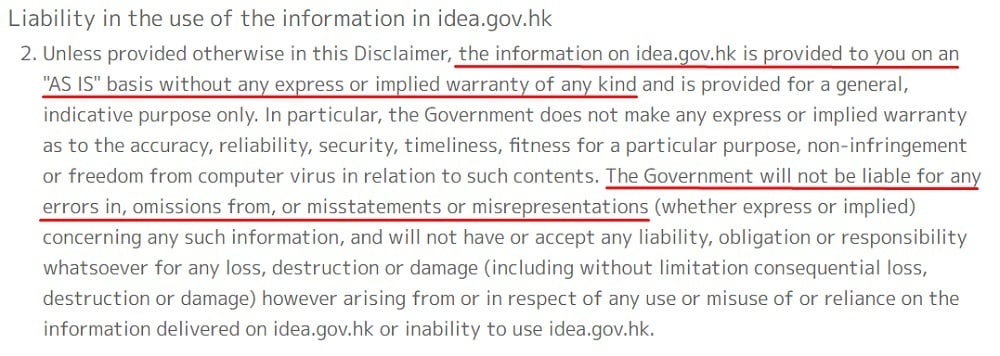
This disclaimer states that information is provided "as is," and that the government isn't responsible for errors, omissions, misstatements, or misrepresentations.
Consent
It's a good idea to get consent from each participant before giving them access to the survey and beginning the data collection process.
Here's how Harvard University's Center for Education Policy Research addresses the issue of Consent for those considering participating in its Year-two Control School Leader Survey:
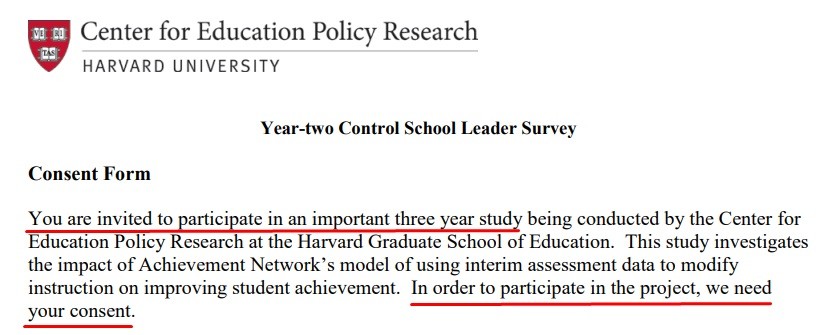
In addition to giving students a brief overview of the study, the opening paragraph makes it clear that consent is required before participation.
Consent forms may also ask users to affirm that:
- They are participating voluntarily
- They are legally an adult in the jurisdiction in which they live
- They have read and understand the information provided
Compensation
Companies that provide contract survey services generally compensate users for participating.
Compensation is a great way to entice people who may not participate otherwise. However, even with unpaid surveys, people may participate out of a sense of duty or because they think their input will help bring about positive change.
Here's how Harvard University addresses compensation for its Year-two Control School Leader Survey:

In this case participants receive two gift cards, and Harvard lets them know when they'll get each one.
Risks Associated with the Survey
Most surveys aren't particularly risky, but participation can lead to social, economic, and psychological risks when data is leaked or anonymity is compromised.
Here's how Bowling Green State University addresses risk for its campus recycling survey:

Data risks are another real thing to consider. You'll have a tough time rounding up survey participants if you can't assure them that their data will be protected while it's in your possession.
For this reason and others, data and identity protection should be addressed early on.
In its consent form, Harvard lets participants know that collected information will be reported anonymously without any personal identifying information:

Remember that it's normal that you may need either all of these disclaimers, or just one or maybe two. It really depends on the nature of your survey and your business, and some of these disclaimers may just not apply to you.
How and Where to Display Disclaimers for Surveys

General survey information and disclaimers are typically placed at the beginning of a survey or linked within other legal agreements such as a Terms agreement.
Since many surveys are conducted online, you can present your disclaimers in text before a user officially starts a survey, as seen here from Bowling Green State University:
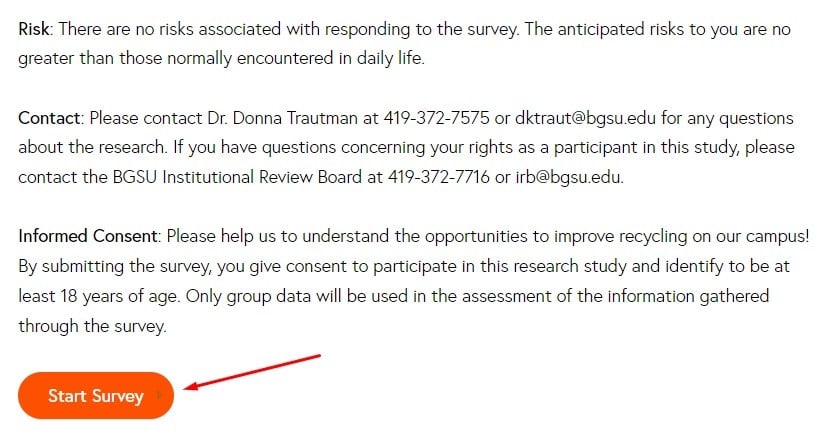
In addition, disclaimers for surveys are sometimes found within Terms and Conditions agreements or other similar terms documents.
In the following example, the University of Victoria has a separate Terms of Service agreement that solely applies to its relationship with survey company SurveyMonkey:

In its survey disclaimer, the University of Victoria lets users know that:
- Round-the-clock access to Survey Monkey's website isn't guaranteed
- It's not responsible to for third party content linked to on SurveyMonkey's web pages
Privacy Policies are also worthwhile places to include survey disclaimers and other survey-related information.
In the following example, The University of Roehampton notes how the data it collects - including that from surveys - may be used or shared:
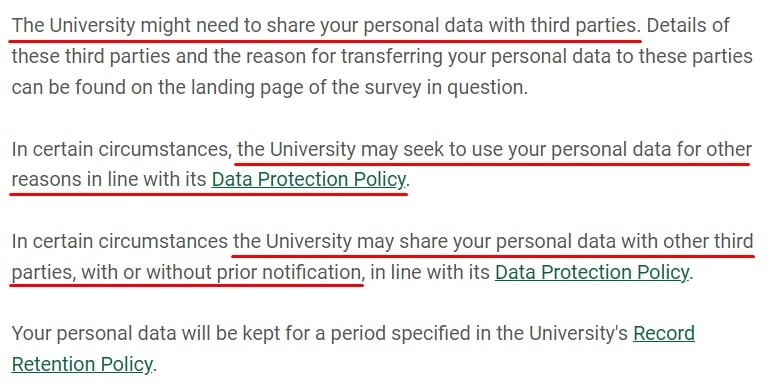
The University uses its Privacy Notice to let participants know that:
- Their personal data may be shared with third parties, with or without prior notification (if so, more information can be found on individual survey landing pages)
- The University may seek to use collected data for additional reasons
- The data storage term will be in accordance with the University's Record Retention Policy
Summary
Surveys can provide valuable information that can help organizations remain competitive by improving their products and services.
By including well-written survey disclaimers, you can protect yourself and your organization while letting participants know what important information relevant to them when taking your survey.
Disclaimers for surveys can vary greatly, but here's a list of some standard types:
- Professional relationships
- Affiliate links
- Third party links
- Copyright
- Errors and omissions
- Consent
- Compensation
- Risks
Disclaimers for surveys are generally displayed somewhere close to the survey, such as at the start of it before a user answers the first question, and also within Terms and Conditions agreements.
